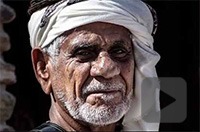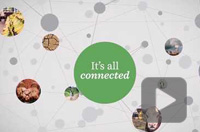FTA at GLF Bonn 2017
The CGIAR Research Program on Forests, Trees and Agroforestry (FTA) will be participating in various ways in the Global Landscapes Forum (GLF) in Bonn, Germany, on Dec. 19-20.
The GLF is the world’s largest science-led multisectoral platform on landscapes, bringing together world leaders, climate negotiators, policy makers, development practitioners, private sector representatives, world-class scientists, civil society and the media to accelerate action towards the creation of more resilient, equitable, profitable, productive and healthy landscapes.
FTA is organizing a Discussion Forum along with the International Union of Forest Research Organizations (IUFRO) titled ‘Rainfall Recycling’ as a Landscape Function: Connecting SDGs 6, 13 and 15, as well as participating in Enhancing tenure security and gender equality in the context of forest landscape restoration and Agroforestry’s role in landscape restoration: Connecting SDGs 15, 13, 1 and 3. FTA scientists from the Center for International Forestry Research (CIFOR) and the World Agroforestry Centre (ICRAF) will also take part in other Discussion Forums at the event, listed in full on the GLF Bonn agenda.
FTA will have a presence in the GLF’s Inclusive Landscapes Finance Pavilion and Restoration Pavilion. Visit FTA’s booths, organized in collaboration with Tropenbos International (TBI), CIFOR and other partners, to network, find resources and materials, and hear talks that are set to take place in the pavilions.
Furthermore, FTA scientists from CIFOR and CIRAD will present Landscape Talks over the two-day event, as outlined below.
Discussion Forums
| ‘Rainfall Recycling’ as a Landscape Function: Connecting SDGs 6, 13 and 15 | |
| Dec. 19, 2pm – 3.30pm | Hosted by the CGIAR Research Program on Forests, Trees and Agroforestry (FTA), with the International Union of Forest Research Organizations (IUFRO) |
| Climate change is a reality and, for those most affected by it, it is often experienced as a change in the most basic commodity: water. Drawing on the insights of farmers and local communities, this session examines the role of forests in regulating the water cycle.
New research suggests that vegetation plays a critical role in the frequency and intensity of rainfall. This discussion forum will explore the implications on the many areas affected by these effects — land restoration, water management and climate change adaptation — toward an integrated approach for land/water and climate for the SDGs. The discussion forum will build on a successful online symposium that took place in May 2017. The discussion will also discuss highlights of the current Global Forest Expert Panel (GFEP) on forests and water, which is expected to issue a policy relevant global assessment report in the first half of 2018. Read more about this discussion forum on the event page or the event flyer. |
|
| Enhancing tenure security and gender equality in the context of forest landscape restoration | |
| Dec. 19, 4pm – 5.30pm | Hosted by World Bank, with Program on Forests (PROFOR), the Center for International Forestry Research (CIFOR), CGIAR Research Program on Forests, Trees and Agroforestry (FTA), CGIAR Research Program on Water, Land and Ecosystems (WLE) and International Union for Conservation of Nature (IUCN) |
| The breadth and ambition of international commitments to restore the environment often hide the failure to consult – and directly benefit – the communities who rely on the targeted landscapes. Furthermore, past initiatives have occasionally exacerbated existing social inequities. Therefore, involving local communities, institutions and interests is necessary for a sustainable environmental agenda.
By drawing on a broad range of stakeholders in an open discussion, the Forest Landscape Restoration (FLR) agenda aims to fully incorporate gender-awareness and residents’ concerns. As a general theme, the panel will seek to identify conflicts and synergies between forest restoration, tenure security and gender equality. |
|
| Agroforestry’s role in landscape restoration: Connecting SDGs 15, 13, 1 and 3 | |
| Dec. 20, 11am – 12.30pm | Hosted by the World Agroforestry Centre (ICRAF), with Humanist Institute for Co-operation with Developing Countries (HIVOS) and the CGIAR Research Program on Forests, Trees and Agroforestry (FTA) |
| Inspired by the Sustainable Development Goals, the session will focus in on the accomplishments and future of Agroforestry as a path towards sustainable landscape restoration. By offering a route to reconciliation between the frequently competing claims of agriculture and reforestation, Agroforestry is playing an increasingly central role in policy-making.
The session aims to achieve a vital exchange of knowledge on ecosystem functionality, biodiversity, livelihoods, climate change among other topics. From this discussion, the forum will demonstrate the potential dividend to human well-being offered by landscape restoration in developing countries. |
|
Pavilions
| Inclusive Landscapes Finance Pavilion | |
| The Inclusive Landscapes Finance Pavilion, which is hosted by the Landscapes for People, Food and Nature Initiative, actively advances the quantity and quality of landscape investment and finance, and inclusive business development. It will advance discussion, collaboration and partnerships around the topics of inclusive landscape investment, regenerative business model development, finance and investment coordination at the landscape level, and alternative fund and deal structures to support integrated landscapes. The pavilion seeks to facilitate valuable new connections and accelerate action between key groups in the sustainable finance ecosystem. By creating a continuous space, and rigorous sessions, actors will be able to work out investment commitments, announce new funds, tools, partnerships or services, and request new partners or backers.
FTA, TBI and other partners will also organize a discussion titled Inclusive financing and business models – actions for upscaling, to take place in the pavilion on Dec. 20 from 2pm – 3.30pm. FTA and TBI will also host a booth in this pavilion. |
| Restoration Pavilion | |
| The Global Partnership on Forest Landscape Restoration (GPFLR) confronts the world-wide problem of deforestation through its global network of grassroots level practitioners and supporters. As a “think and do tank” the GPFLR acts as a nexus of coordination in the effort to fulfil the Bonn Challenge to restore 350 million hectares of deforested land 2030. With a track record of high-level events showcasing cutting-edge research and ground-breaking initiatives, the GPFLR’s Restoration Pavilion will bring forward decision-makers from the local, national and international level to drive a diverse agenda ranging from Natural Regeneration, integration of forest resources, monitoring, capacity building and regional schemes such as AFR100 and Initiative 20×20.
FTA materials will be available at the UNCCD booth on Working Landscapes in this pavilion. FTA partner institution Bioversity International will also host a booth on Integrating Forest Genetic Resources for Resilient Restoration. |
Landscape Talks
| Integrated landscapes approaches: From theory to practice | |
| Dec. 19, Block 1 (9am – 10.30am) | Terry Sunderland, Principal Scientist, CIFOR |
| Integrated landscape approaches are regularly touted as a potential means to reconcile local socio-economic and global environmental challenges. The landscape represents an ideal scale at which to implement strategies and evaluate progress of initiatives designed towards more sustainable outcomes for both people and nature. As such, landscape approaches are increasingly acknowledged within global environmental policy discourse and have generated significant discussion and debate within the scientific and practitioner communities.
However, despite this momentum, there remains a lack of consensus on: how to define a landscape approach; how to best apply the approach in practice; and what is the appropriate spatial scale for implementation and analysis. This Talk will highlight key elements of the landscape approach, how it builds on previous initiatives and how we can move forward from theory to practice. |
|
| Why care about peatlands? | |
| Dec. 19, Block 3 (4.15pm – 5.45pm) | Daniel Murdiyarso, CIFOR |
| Adopting a new perspective on landscapes and water | |
| Dec. 20, Block 5 (11am – 12.30pm) | Bruno Locatelli, Scientist, CIRAD/CIFOR |
| Forest-driven water and energy cycles are poorly integrated into local, national, and international decision-making on climate change, land use and water management. This Talk will present new research results on forest, water, and energy interactions that provide the foundations for cooling terrestrial surfaces and for distributing water resources. Our call to action targets a reversal of paradigms, from a carbon-centric model to one that treats the hydrologic and climate-cooling effects of trees and forests as the first order of priority. | |
| Tracing the life of an avocado from Amsterdam to Mexico, CIFOR | |
| Dec. 20, Block 6 (4.30pm – 6pm) | John Colmey, CIFOR |



